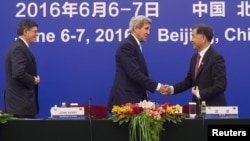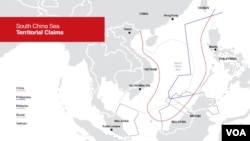U.S. Secretary of State John Kerry says Washington and Beijing will enforce sanctions against North Korean for its recent nuclear weapons and ballistic missile program. But China and the U.S. apparently remain at an impasse over China's territorial claims in the South China Sea.
"Neither one of our nations will accept North Korea as a nuclear weapons state," Kerry told reporters at the end of the eighth annual U.S.-China Strategic and Economic Dialogue in Beijing. Kerry said the U.S. and China have agreed to "fully enforce" a new round of tougher sanctions passed by the United Nations earlier this year in response to Pyongyang's fourth nuclear test.
China, which is the North's main ally and benefactor, supported the tougher sanctions against the North.
Restraint urged
Meanwhile, Kerry called on all nations with competing territorial claims in the South China Sea to "exercise restraint" and resolve their differences through diplomacy. Tensions are growing in the region over China's aggressive buildup of military installations on unoccupied islands and reefs in the South China Sea, many of which are also claimed by Taiwan, Vietnam, the Philippines, Brunei and Indonesia.
About $5 trillion of annual trade passes through the South China Sea, which is also believed to hold significant oil and gas reserves. Beijing is reportedly considering establishing an Air Defense Identification Zone over portions of the South China Sea, after being angered by U.S. surveillance flights in the airspace. Kerry has called such action "a provocative and destabilizing act."
Freedom of navigation, overflight
Kerry said he and his Chinese counterpart, State Councilor Yang Jiechi, reaffirmed their governments' commitment to uphold freedom of navigation and overflight in the South China Sea.
On the economic front, U.S. Treasury Secretary Jack Lew said China has concluded that there should be no further weakening of its currency, the yuan, and agreed to continue pursuing market-based economic reforms.
But Lew said the two sides failed to reach an accord on the excess capacity in China's aluminum sector, which Washington complains allows China to sell the metal cheaply overseas.





